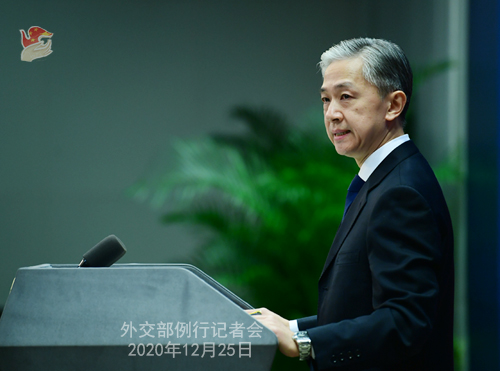


Foreign Ministry spokesman Wang Wenbin speaks at a news conference in Beijing, on Dec 25, 2020. (Photo/fmprc.gov.cn)
China on Friday rebutted a recent United States government report that accused Beijing of human trafficking, including forced labor in the fisheries sector, saying the accusation is a malicious smear that distorts facts.
"China is firmly opposed to it," Foreign Ministry spokesman Wang Wenbin said at a regular news briefing in Beijing.
The joint report, which was submitted to the US Congress by the US State Department and the National Oceanic and Atmospheric Administration on Thursday, listed 29 countries including China that are most at risk for human trafficking in the sector.
Wang said Chinese companies have voluntarily established labor cooperation with countries and the former adhere to international practice concerning distant-water fisheries and have realized win-win results that benefit both sides.
"The allegations are totally groundless," he said, adding that the Chinese side is also maintaining good communications with authorities in relevant countries over the establishment of bilateral mechanisms on fishery labor cooperation.
The spokesman said that as a responsible fisheries country, China attaches high importance to the conservation and sustainable use of fishery resources and actively fulfills its international obligations.
China has established a full-fledged distant-water fishery management system, implemented the strictest vessel monitoring system in the world and practices a fishery moratorium in the Southeast Pacific and the Southwest Atlantic, Wang said.
China also joined eight regional fishery management organizations with good performance in fulfilling duties, he added.
"In the meantime, we are actively working together with the international community to crack down on illegal, unreported and unregulated fishing activities," Wang said.
The spokesman pointed out that the duration of US fishing activities on the high seas has greatly exceeded the amount of days stipulated by fishery management organizations and the US has been doing this for many years.
"This US behavior has raised concerns from members of relevant organizations. I wonder whether the US should reflect upon its own practices," Wang said.
 Fire brigade in Shanghai holds group wedding
Fire brigade in Shanghai holds group wedding Tourists enjoy ice sculptures in Datan Town, north China
Tourists enjoy ice sculptures in Datan Town, north China Sunset scenery of Dayan Pagoda in Xi'an
Sunset scenery of Dayan Pagoda in Xi'an Tourists have fun at scenic spot in Nanlong Town, NW China
Tourists have fun at scenic spot in Nanlong Town, NW China Harbin attracts tourists by making best use of ice in winter
Harbin attracts tourists by making best use of ice in winter In pics: FIS Alpine Ski Women's World Cup Slalom
In pics: FIS Alpine Ski Women's World Cup Slalom Black-necked cranes rest at reservoir in Lhunzhub County, Lhasa
Black-necked cranes rest at reservoir in Lhunzhub County, Lhasa China's FAST telescope will be available to foreign scientists in April
China's FAST telescope will be available to foreign scientists in April "She power" plays indispensable role in poverty alleviation
"She power" plays indispensable role in poverty alleviation Top 10 world news events of People's Daily in 2020
Top 10 world news events of People's Daily in 2020 Top 10 China news events of People's Daily in 2020
Top 10 China news events of People's Daily in 2020 Top 10 media buzzwords of 2020
Top 10 media buzzwords of 2020 Year-ender:10 major tourism stories of 2020
Year-ender:10 major tourism stories of 2020 No interference in Venezuelan issues
No interference in Venezuelan issues
 Biz prepares for trade spat
Biz prepares for trade spat
 Broadcasting Continent
Broadcasting Continent Australia wins Chinese CEOs as US loses
Australia wins Chinese CEOs as US loses